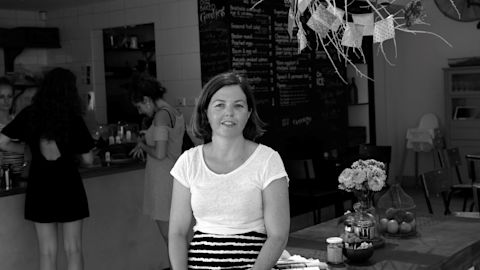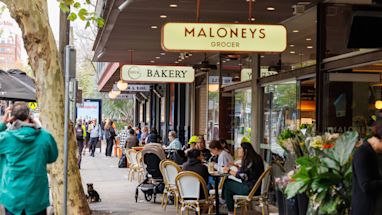Being successful in Sydney retail requires an innovative approach. Earlier this year, 15 local retailers participated in an intensive City of Sydney workshop that helped them learn from leading entrepreneurs.
The retail innovation program put these small businesses through their paces, challenging the participants to think differently about their business, innovate their business models and embrace new trends.
The owners of a café, vegan shop and furniture and homewares store share how the program challenged them to think beyond bricks and mortar.
Kate’s Cakes by Saint John Espresso
1/73 St Johns Road
Glebe
Kate Fellowes runs the established Glebe café, Saint John Espresso. Her sustainability and community values are reflected in her composting food waste and, through the Bread and Butter Project, employing a baker who arrived in Australia as a refugee. She was happy about how her 3-year-old business was tracking, but the program made her consider alternative revenue streams.
“How many people are going to walk into your shop on any day is out of your control, especially if it’s raining,” Kate said. “So in the program, I started thinking about the different ways I’m already bringing in money.”
That’s where Kate’s Cakes came in.
“I was already trialling cake deliveries with my customers. But the investor types [in the program] kept asking if I could do a decent cake for their office,” she said.
As a result, Kate adapted her idea of cake deliveries to target office managers.
“Without this course, I wouldn’t be thinking from a problem-solving perspective,” she said.

Vegan Grocery Store
90 Glebe Point Road
Glebe
Owner of national business the Vegan Grocery Store(formerly known as The Cruelty Free Shop), Jessica Bailey, wanted to learn more about retail, rather than “making it up as I go along”.
Jessica, who has single-handedly run her business since 2001, found the program challenging but “phenomenal”.
"Digital marketing was a revelation for me,” Jessica said. “I realised how powerful digital marketing can be when done right and how many tools there are to help you.”
With the help of digital experts, Jessica identified her target audience and shifted marketing dollars to reach them.
Jessica identified that one-third of the population is interested in reducing its meat and dairy intake. She also discovered that the fastest growing sectors in retail are plant-based products and subscription boxes. Her insight was to combine the 2 and use data to best target her market.
“We have a large customer database I never did anything with. I learnt how to use this data and run paid ads on Facebook, Google ads and target newsletters. This means I’m now sending the right customers the message they want to hear,” Jessica said .

Koskela
1/85 Dunning Avenue
Rosebery
When Sasha Titchkosky co-founded design store Koskela 19 years ago, there was no startup culture.
“People just started a business,” she said. “But it’s really beneficial to be exposed to that thinking. Understanding who you’re benefiting, what the problem is and being able to articulate your business succinctly is hugely useful.”
As a result of the program, Sasha redesigned her website with a better focus on e-commerce. But the interiors expert has bigger things in the works.
Koskela is in discussions that would see the business furnish new apartments built especially for long-term rentals.
“The program helped me take the time to research and put my build-to-rent idea through its disciplines. It was also great to focus on the positives of retail, when there is usually a lot of negativity about the sector.”

Life after the program
All 3 retailers agree the retail innovation program is best suited to business owners who can step away from their day-to-day activities and consider the bigger picture.
Half a year after completion, participants continue to draw benefits from the program. Strong connections were formed between the businesses, and the participants have been supporting each other.
“We try to catch up once a month,” Kate said, who’s also a trial business for another participant’s food-costing app. “We’ve found business partners in a way - we’re all gunning for each other.”
20 new candidates have been chosen for the 2nd retail innovation program in February 2020.
Published 11 November 2019, updated 29 February 2024



